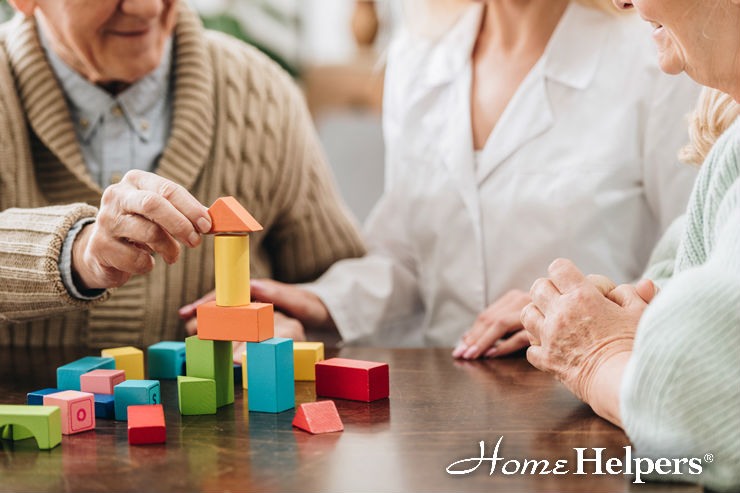It can be difficult at times to determine the difference between normal memory lapses as we age, and a more serious cognitive decline such as Alzheimer’s or dementia. If you notice your elderly loved one forgetting names, dates, or appointments on a regular basis, it could be cause for concern.
While some memory loss is a common sign of the aging process, it does not necessarily mean dementia is setting in. There are lots of things you can do to keep your loved one stimulated mentally, so their brain function stays sharp as they age. The following ideas are exercises you can do to help improve cognitive function and memory, as well as slowing the effects of conditions like Alzheimer’s and dementia.
These exercises can help improve neuroplasticity, which is a fancy word for how well the brain reacts to changes and adapts to new information and situations. Brain games can be like mental gymnastics and go a long way in preserving good neuroplasticity. The better that is, the faster you’ll be able to recall important information, as well as preserve good memory skills.
There are two types of mental exercises: skill retaining and skill developing. It is important to always be learning new things at any age, in order to keep the brain healthy and functioning well. That falls under the “skill development” category. It is also very important to work on retaining memory by thinking through the skills and abilities that once came easily and talking about them regularly. This would fall under the “skill retaining” category.
Check out the following ideas and exercises you can easily do with your senior loved one as well as yourself, to keep the mind sharp and help prevent memory loss. Remember, the goal is to stay mentally stimulated.
Try your hand at an instrument or a paintbrush
There’s no doubt that one of the best ways to exercise your brain is to pick up a new skill or hobby. Help inspire your elderly loved one to take lessons on something they find interesting, or take lessons in painting, music, cooking, or even knitting. There is a natural sense of accomplishment that comes with learning a new skill, and that alone will keep them motivated to use their brainpower to stay active. Taking a class together is even better! It’s a great way to share time together at the same time you’re keeping the mind stimulated.
Test your recall
Let’s face it—we live in a society where everything we do is digital. No matter what we do, there is an app for everything, so we are not writing things down or making lists the old-fashioned way anymore. One way you can help strengthen memory is to practice recalling the things on your to-do list. Try leaving your shopping list in your purse and recall the things you need to accomplish by memory. Another good way to work on memory is by starting conversations about childhood memories such as pets or homes that the loved one had growing up.
Use your senses
You might not realize it, but the five senses are a critical factor in recalling memories and engaging our minds in the learning process. Engaging in activities with your senior loved ones such as gardening, cooking, or playing music will stimulate the senses as you experience these activities together. Touch, smell, and taste are all wonderful senses to utilize as you talk
Get active
With all the brain workouts, don’t forget the rest of your body needs exercise too! Did you know that staying active helps you feel better, sleep better and have better recall? It’s true! It also goes a long way in stabilizing mood by activating the body’s “happy hormones.” This happens as a result of oxygen to the brain during physical activity. This can also have other benefits such as lowering the risk of diabetes and heart disease. Try going on neighborhood walks or join a free Silver Sneakers class at your local recreation center. If your loved one loves music, get them dancing!
As we have seen, memory loss is a normal part of aging, but it doesn’t have to decrease the quality of life. Trying these ideas will help keep the brain active and increase neuroplasticity, all of which will stave off cognitive decline. For more information on preventing memory loss, contact us today! Our caregivers are compassionate experts in this field.
Legal Disclaimer
This blog provides general information and discussions about medicine, health, and related subjects. The words and other content provided in this blog, and in any linked materials, are not intended and should not be construed as medical advice. If the reader or any other person has a medical concern, he or she should consult with an appropriately-licensed physician or other healthcare workers.
Never disregard professional medical advice or delay in seeking it because of something you have read on this blog or in any linked materials. If you think you may have a medical emergency, call your doctor or 911 immediately.
The views expressed on this blog and website have no relation to those of any academic, hospital, practice or other institution with which may have been mentioned or linked to in the article.

